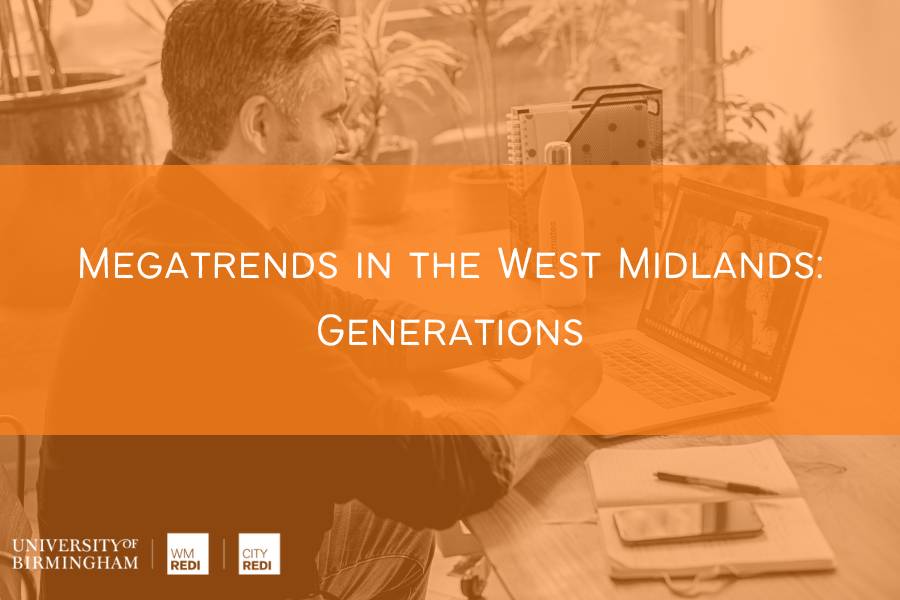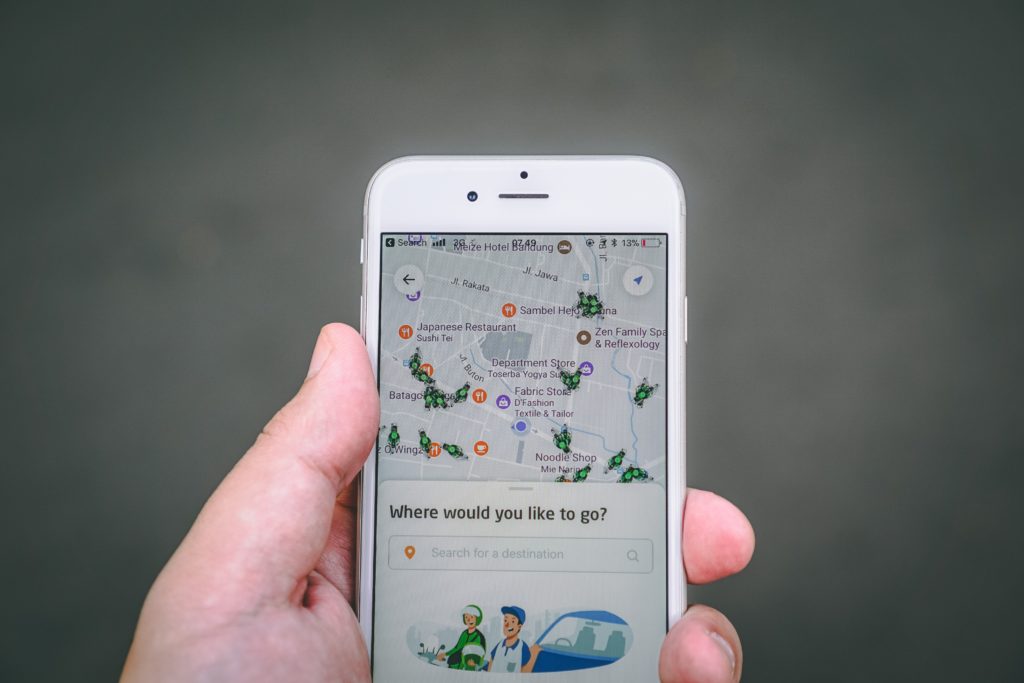
Liam O’Farrell examines the age-old trope of intergenerational conflict.
Does the evidence support the idea of generations at war or is categorising people by age a poor way of understanding our society?
This article is part of larger project looking at Megatrends in the West Midlands. Megatrends are major movements or patterns or trends that are having a transformative impact on business, economy, society, cultures and personal lives. The project examines some of these megatrends in a series of provocations, podcasts and a report.
View the full provocation.
Age has traditionally been one of the main demographic categories used to understand society. In discourse stretching back thousands of years, there have been concerns that young people are entitled, lack morals, and have insufficient respect for their elders (Protzko and Schooler, 2019; Resnick, 2019).
However, evidence shows that age has weak predictive power for a person’s values. The same is true for most demographic categories (More in Common, 2020). For example, despite popular belief otherwise, it is rare that people become more conservative as they age. Instead, as people grow older, they become more confident in openly identifying as conservative (Peterson et al., 2020). This is known as the “shy Tory factor”. Research also shows that the idea of intergenerational conflict is a myth (Emery, 2012; Bristow, 2020). The potential for such conflict is mitigated by family connections, softening feelings of affective polarisation, or dislike based on differences of opinion (More in Common, 2020). Nevertheless, we should remain cautious that confected stories of young people being ‘entitled’, or old people being a ‘burden’, do not feed resentment in our society (Walker, 2008).

Individual psychology has greater predictive power across a range of issues than demographics. Psychology can be established through a ‘moral foundations questionnaire’, establishing scores for a series of values including loyalty, authority, and fairness (Haidt, 2012). This approach updates the antiquated left-right notion of politics and builds on the addition of a libertarian-authoritarian axis that has become increasingly popular in political science (Evans et al., 1996). In turn, moral foundations theory enables researchers to map the cognitive diversity in the population, a growing area of research on diversity and inclusion (Landemore, 2012).
Generations cannot be described in broad terms owing to the cognitive diversity within them. While there may be certain beliefs held by most of the cohort, these are never unanimous. Analysis of age cohorts is best done by reflecting on responses to experiences in childhood and teenage years which influence the formation of individuals’ values (Zwanka and Buff, 2020). For instance, many people have an underlying authoritarian predisposition causing them to favour authority, hierarchy, and uniformity. Encountering real or perceived threats exacerbates this predisposition, and when triggered beyond a threshold, behaviours such as intolerance and supporting extremist ideas are manifested (More in Common, 2020). The idea of perceptions is important. People are not instinctively objective, instead viewing the world through their own set of perceptions (Berger and Luckmann, 1966).
| Generation | Birth years | Overview | Examples |
| Silent Generation | 1928-1945 | Experienced the Great Depression and WW2 at home during formative years.
Progressive members led the Civil Rights movement, the Summer of Love and May 68. Stereotyped as industrious penny-pinchers. |
Martin Luther King Jr.
Bob Dylan John Lennon Joe Biden
|
| Baby Boomers | 1946-1964 | Experienced the Cold War, decolonisation, and the Space Race during formative years.
Grew up under the post-war welfare state, many embraced neoliberalism as adults. Stereotyped as individualistic workaholics. |
Bill gates
Madonna Michael Jackson Donald Trump |
| Generation X | 1965-1980 | Experienced the Vietnam War, the AIDS pandemic and MTV during formative years.
The ‘latchkey’ generation- normalisation of divorce and both parents working. Stereotypes as cynical slackers |
Kurt Cobain
Julian Assange Health Ledger Elon Musk |
| Millennials/Generation Y | 1981-1996 | Experienced the growth of the internet, the EU and 9/11 during formative years.
Best-educated generation in history but with very poor career and financial prospects. Stereotyped as naïve optimists. |
Mark Zuckerberg
Lady Gaga Usain Bolt Rihanna |
| Generation Z | 1997-2012 | Experienced the Great Financial Crisis, social media, and covid-19 during formative years.
The first generation of ‘digital natives’, linked with significantly lower reading comprehension. Stereotypes as straightlaced and stressed out. |
Greta Thunberg
Malala Yousafzai Kylie Jenner Adut Akech |
‘Stressed, depressed and exam-obsessed’ is one characterisation of Generation Z (The Economist, 2019). Analysts at Goldman Sachs say that Zoomers are more money-oriented and less interested in sex, drugs, and alcohol than Millennials (Edwards, 2015). However, making generalisations about an entire group based on their age is a flawed way of analysing society. By way of comparison, consider how implausible it would be to say that “white people think this” or “black people think that”.
A better way of understanding the generations is to consider them as groups of people with shared formative experiences (Zwanka and Buff, 2020). Collective experiences differ between countries and contexts, but for Gen-Z three of these experiences were truly global: social media, the Great Recession, and Covid-19. In the UK, researchers also reference Brexit as a formative event that has strongly impacted how Zoomers relate to politics (Frank, 2019).
Generation Z is the first generation of “digital natives”. However, they hold mixed attitudes towards technology. For example, a slight majority (51%) favour face-to-face workplace communication (Schawbel, 2014), and growing numbers are ambivalent towards social media. Only 3 in 5 of under-34s used Facebook in 2019, down from 4 in 5 in 2017 (Edison Research, 2019). Some are moving to more secure platforms or those where content is more ephemeral, such as TikTok, Signal, or Telegram, while others are leaving social media altogether (Hannan, 2018; Parker and Igielnik, 2020). In part, this is due to the mental health burden of the platforms. In focus groups, many say they feel stressed by images of “perfect” bodies and lifestyles online (Gunnell et al., 2018; Dobson, 2020).
There are further problems facing these digital natives. Gen-Z is reading far less than previous cohorts. Only 12% of young people read some form of print every day – down from 70% in the 1970s (Wolf, 2019). Among this cohort, reading has not been displaced to electronic formats; only 32% say they have read an eBook, and a majority of Zoomers say they read less in 2019 than they did three years prior (Vercelletto, 2019). This low rate of reading is linked with weaker critical and abstract thinking skills and an unprecedented reduction in IQ scores. Since 1990 there has been an average drop of 7 IQ points among young people in Scandinavia, and sharp drops are also recorded among high-achieving young people in the UK (Flynn and Shayer, 2018; Wolf, 2019).

Alongside the rise of social media, a further formative event for Gen-Z was the Great Recession and austerity policies. On current trends, young people are set to have lower living standards than their parents and live in a more unequal society (Jungblut and Anderson, 2019). Rising economic inequality is correlated with increased distrust in government and institutions (Uslaner and Brown, 2005; Piketty, 2013). In the UK, the impact of austerity has disproportionately fallen on marginalised communities (Alston, 2018). The psychological impacts of austerity include increased feelings of fear, distrust, instability, and insecurity, as well as a sense of powerlessness (McGrath et al., 2016).
Such feelings are contributing to a mental health crisis in the cohort. Zoomers report the highest stress levels are more likely to report poor mental health and to have accessed treatment from a mental health professional (Bethune, 2019). On average, Zoomers are less optimistic about the future than Millennials (Edwards, 2015). One way this greater perception of instability and threat has impacted value formation is an increased prioritisation of achieving financial stability over personal fulfilment (Gomez et al., 2020). Feelings of insecurity lead many to favour authority and government intervention, as some 7 in 10 Zoomers in the US do (Parker and Igielnik, 2020).

Likewise, Covid-19 is influencing the development of values among the cohort in ways that are still unfolding. It could be argued that Zoomers are well-adapted to a socially distanced world, being heavy users of the internet before the pandemic (The Economist, 2019). However, there are worrying signs that Zoomers are more susceptible to conspiracy theories they encounter online. For instance, 13% of Zoomers doubt the official narrative of the Holocaust, compared to only 2% of over-65s (Carter, 2020). Men under 25 and migrants who speak a language other than English at home are found to be significantly more likely to believe conspiracy theories about Covid-19 (McCaffery et al., 2020; Pickles et al. 2020). Members of Gen-Z in work have been hardest hit by the impacts of the pandemic as they are disproportionately employed in the worst-affected service sectors. The experience of unemployment is found to undermine individuals’ mental health and resilience (McGrath et al., 2016).
Another economic change is the growing prevalence of temporary contracts, referred to as the “gig economy”. 61% of Gen-Z in the UK say they would prefer a traditional full-time job over temporary contracts (Workforce Institute, 2019). Focus groups with Zoomers find they are critical about temporary work but feel powerless to change it. In the UK, low feelings of agency are attributed in part to Brexit, where most young people think their views were ignored (Berry and McDaniels, 2020). Many are pessimistic about the jobs market and the UK’s economic prospects, with significant concerns about pay, working conditions, and competition for roles. Surveys of Zoomers find relatively little awareness about the risks of automation, particularly among non-graduates. This is concerning, given that lower-skilled workers are more likely to find their jobs at risk (Berry and McDaniels, 2018).

Beyond these concerns, data show that Zoomers share Millennials’ interest in equality, diversity, and inclusion in the workplace, a product of the increasing diversity in these cohorts (Francis and Hoefel, 2018; Catalyst, 2020). Broader trends towards favouring ethical organisations and corporate social responsibility also continue to hold (Middlemiss, 2015). Gen-Z is even more likely than Millennials to prefer job-hopping to staying at one organisation and building a career. 83% of Zoomers in the US said they plan to stay in a role for one to three years before moving on (Crouch, 2015). While this is a challenge to traditional ideas of work, it should also be viewed as a response to a more precarious world where permanent contracts are rarer.
Future scenarios – implications for the West Midlands
“Do nothing”
Zoomers experience higher rates of mental illness, feelings of stress and insecurity, and pessimism about their prospects. This trend is concerning on two levels. Firstly, there is the risk of structural unemployment for those who cannot adapt to a jobs market that automates low-skilled work and demands advanced skills. Secondly, there are political implications. Negative attitudes towards automation correlate with anti-immigrant attitudes and conservative social values (Gamez-Djokic and Waytz, 2020). As such, economic trends are increasing external threat perceptions. This is a key trigger of the authoritarian predisposition (for those who hold it), who are more likely to be right-wing.
“Assuaging fears”
The key to building a more cohesive future is assuaging the fears of those who feel left behind and facilitating a more just distribution of resources and opportunities across the city. Skills training targeted at those in work at greatest risk of being automated can help individuals adapt to the changing economy. Investing greater resources into mental health support and normalising talking about this topic will help reduce stress levels and decrease feelings of insecurity and instability. Developing civic engagement strategies can also help overcome low feelings of political agency.
Key policy messages
- Britain is ageing and fewer children are being born. This incentivises automation, in turn putting a premium on creative skills. Low-skilled young people need targeted skills training support.
- Despite being the first generation to grow up online, Zoomers favour physical working and increasingly dislike social media. Digital by default appears to be a flawed strategy.
- Generation Z is experiencing a mental health crisis. Greater resources, auxiliary services, and parity of esteem for mental illnesses are required.
- The Gen-Z cohort seems to have weaker critical thinking skills, feels disempowered and unheard in politics, and appears more susceptible to populism. Therefore, strategies are needed to strengthen democratic culture.
- Zoomers and Millennials prefer regular job-hopping instead of staying in one organisation. Employers need to adapt to this and streamline their recruitment processes.
This blog was written by Liam O’Farrell, Researcher, University of Sheffield, and a City-REDI Associate.
Disclaimer:
The views expressed in this analysis post are those of the authors and not necessarily those of City-REDI / WMREDI or the University of Birmingham.
